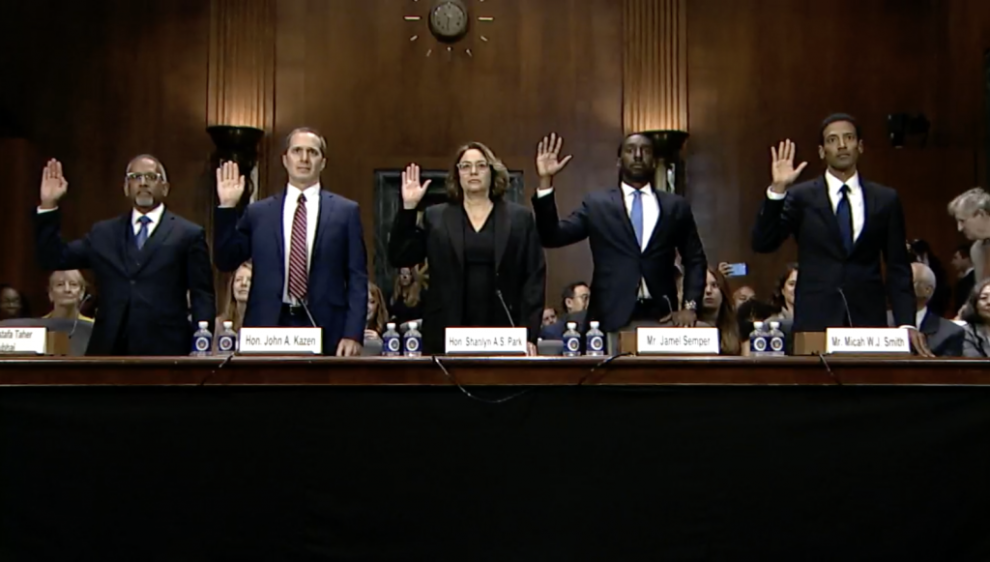WASHINGTON — President Joe Biden’s two nominees for federal court judgeships in Hawaii had a relatively easy go of it Wednesday when appearing before the Senate Judiciary Committee for confirmation.
Hawaii Circuit Court Judge Shanlyn Park and Assistant U.S. Attorney Micah Smith only received a handful of questions from the committee, several of which were focused on their upbringing in the islands.
Instead, much of the attention was placed on another Biden nominee, Mustafa Kasubhai, a federal magistrate judge from Oregon who the president wants to promote to a district judgeship in the same jurisdiction.
Republicans repeatedly pressed Kasubhai, a Muslim American and son of Indian immigrants, about previous statements he made about race and diversity in America, including those that seemed to come from the book, “How To Be An Antiracist,” by Ibram X. Kendi.
They also asked him to explain his decision to let those in his courtroom choose their own pronouns and honorifics when appearing before him.
“I think your fellow nominees owe you a debt of gratitude,” said U.S. Sen. Ted Cruz, a Texas Republican. “Because many Biden nominees have been extreme, but your record is so far out of the mainstream that you have attracted virtually all of the questions.”
For the most part, Park and Smith avoided GOP talking points and some members’ ire toward diversity, equity and inclusion in government despite the fact that both nominees would further Biden’s goal of diversifying the judiciary.
The most antagonistic questions for either nominee came from U.S. Sen. Marsha Blackburn, a Republican from Tennessee. Blackburn was particularly concerned about a case Smith was assigned to while working as a federal prosecutor in the Southern District of New York.
The senator said the case involved a defendant who was arrested for sexually assaulting a 12-year-old girl and who was later found to have images in his possession of prior instances of child sexual abuse.
Blackburn wanted to know why Smith, who was the lead prosecutor on the case, only asked for a 10-year prison sentence when the federal guidelines would have required more time behind bars. She noted that the judge rejected Smith’s recommendation and sentenced the man to 15 years in prison plus another 10 years of probation.
“This is something that is terribly concerning to me,” Blackburn said.

In response, Smith said he remembered the case well and that it was one of the first he handled after starting the job. He said that oftentimes sentencing recommendations are made in consultation with supervisors in the prosecutor’s office and that he would not have had sole discretion in deciding how many years to offer up.
“When I appear in that forum I’m representing the office and I do that as a prosecutor in all of my cases,” Smith said. “If I were fortunate to be confirmed I would do the same as a judge. I would set any personal views aside, and I would endeavor to apply the law faithfully and define the facts fairly.”
Both Park and Smith had the support of Hawaii’s U.S. senators, Brian Schatz and Mazie Hirono, who worked together to vet them for the president using a local judicial selection committee.
During their opening statements, Schatz and Hirono highlighted Park in particular for the fact that if confirmed by the full Senate she will be the first Native Hawaiian woman to serve as a federal district court judge.
“Judge Park’s credentials are impressive by any measure, but the historic nature of her nomination should not be lost on anyone,” Schatz said.
Hirono echoed the sentiment, and noted that Park’s nomination has been supported by several organizations, including the National Asian Pacific American Bar Association, the Native American Rights Fund and the Native Hawaiian Bar Association.
“We say it’s high time and long overdue,” Hirono said.
Park earned her law degree from the University of Hawaii and spent much of her career working as a federal public defender. In 2021, then-Gov. David Ige appointed her as a judge to the First Circuit Court on Oahu where she worked mostly in family court.
If confirmed, Park will replace Judge Leslie Kobayashi on the Hawaii bench, someone Park said was her mentor. Park is married to Kuuhaku Park, a lobbyist for Matson, one of the most politically connected businesses in the islands.
Park was asked a number of times about her work as a federal public defender and the role she played in the justice system. More than once she noted that having zealous advocacy for those accused of crimes is constitutionally required and ensures that there’s balance.
“It’s necessary in order to have a fair and just criminal justice system that there be zealous representation on both sides of the aisle,” she said.
Smith was described by Schatz as having a story that could only be described as “quintessentially American.”

He’s the son of a Honduran immigrant who grew up in a housing project on Kauai before getting a law degree from Harvard. After graduation, he clerked for Guido Calabresi, a federal appeals court judge, and U.S. Supreme Court Associate Justice David Souter.
Smith worked for several years as an assistant U.S. attorney in the Southern District of New York, which is considered one of the premier destinations for federal prosecutors.
In 2018, he moved back to the islands to continue working as a federal prosecutor and has been involved in some of the state’s most high-profile cases, including the ongoing prosecution of alleged organized crime boss Michael Miske.
Smith was nominated to replace District Court Judge J. Michael Seabright.
Hirono, a member of the Judiciary Committee, spent much of her time Wednesday asking Park and Smith to explain their personal backgrounds and how their experiences shaped them.
Park discussed her father, Louis Souza, a former Honolulu police officer, who once served as president of the Hawaii police union. As a kid, she said, she would see how hard he worked each day and later try to emulate that herself in her own career.
“His example of public service is what drives me to this day,” Park said. “He was vital to my decision to enter into the law.”
Smith offered up his own anecdote about his mother, who he said worked as a Head Start teacher and, in the summers, had a job at KMart to help pay the bills.
“Your parents help you see what’s possible,” Smith said. “Just watching their life stories, the things they were able to do from where they started and where they ended up makes it possible for their children to do the same thing.”
Hirono also asked both the nominees to talk about the importance of diversity and what it means for them as they sit on the precipice of a federal judgeship.
Both Park and Smith agreed that diversity is critical to maintaining credibility of the courts.
“When you have a diverse bench it builds and brings integrity to the institution,” Park said.
“I think diversity in its broadest sense is very important,” Smith added. “When the community sees that the bench and all the positions of public importance are open to everyone from all sorts of walks of life, backgrounds and perspectives it promotes and ensures trust in those institutions.”
The Judiciary Committee will vote on the nominees in the coming weeks before sending them to the full Senate for final confirmation.
Source : CivilBeat











